Key takeaways:
- Understanding and adapting to regulatory changes in mining can lead to new investment opportunities and improved decision-making.
- Compliance not only fulfills legal obligations but also enhances credibility and can prevent costly fines.
- Building strong relationships with regulatory bodies and engaging with industry experts are essential strategies for navigating compliance.
- Resilience, collaboration, and patience are vital in overcoming challenges and capitalizing on investment opportunities in the mining sector.
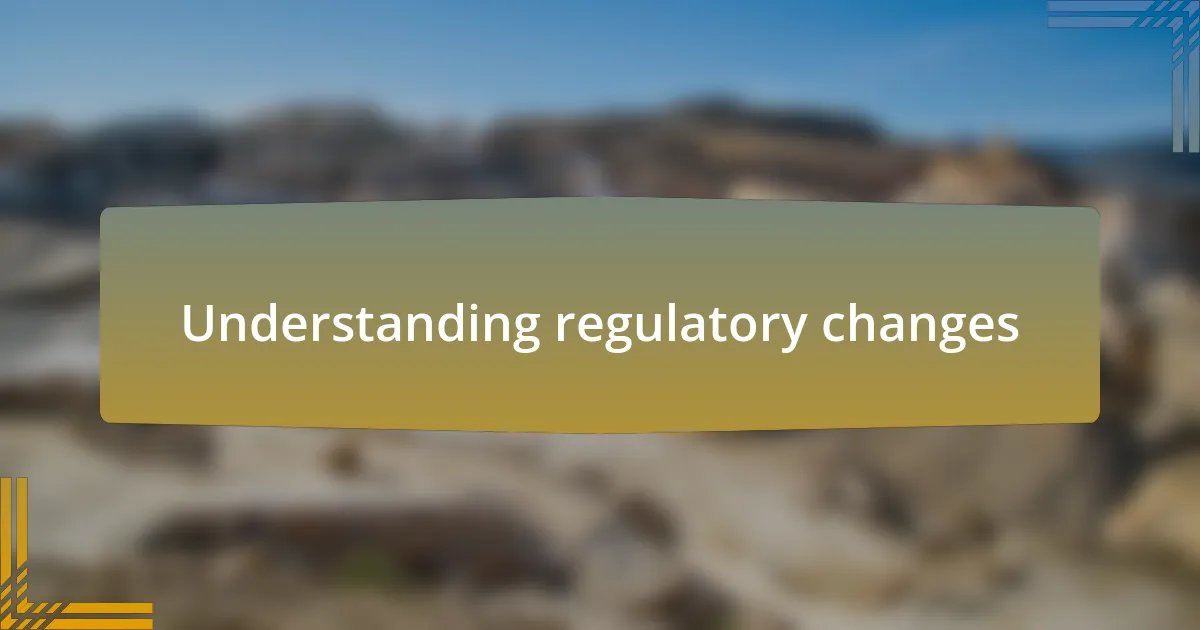
Understanding regulatory changes
Regulatory changes can feel overwhelming at first, especially in the mining investment sector where they’re often complex and laden with legal jargon. I remember when the new environmental regulations came into play; at first, I felt lost amid the paperwork and shifting requirements. Have you ever found yourself staring at a document, wondering how it impacts your investments?
As I delved deeper into these changes, I realized the importance of staying informed. Connecting with industry experts and attending webinars transformed my understanding, providing clarity on how these regulations shape market dynamics. It was enlightening to discover that, while daunting, these changes could also open up new investment opportunities.
Embracing these regulatory shifts has taught me that adaptability is key to success in this field. It’s not just about compliance; it’s also about leveraging insights to make more informed decisions. How have you navigated such changes? I’d love to hear your experiences.
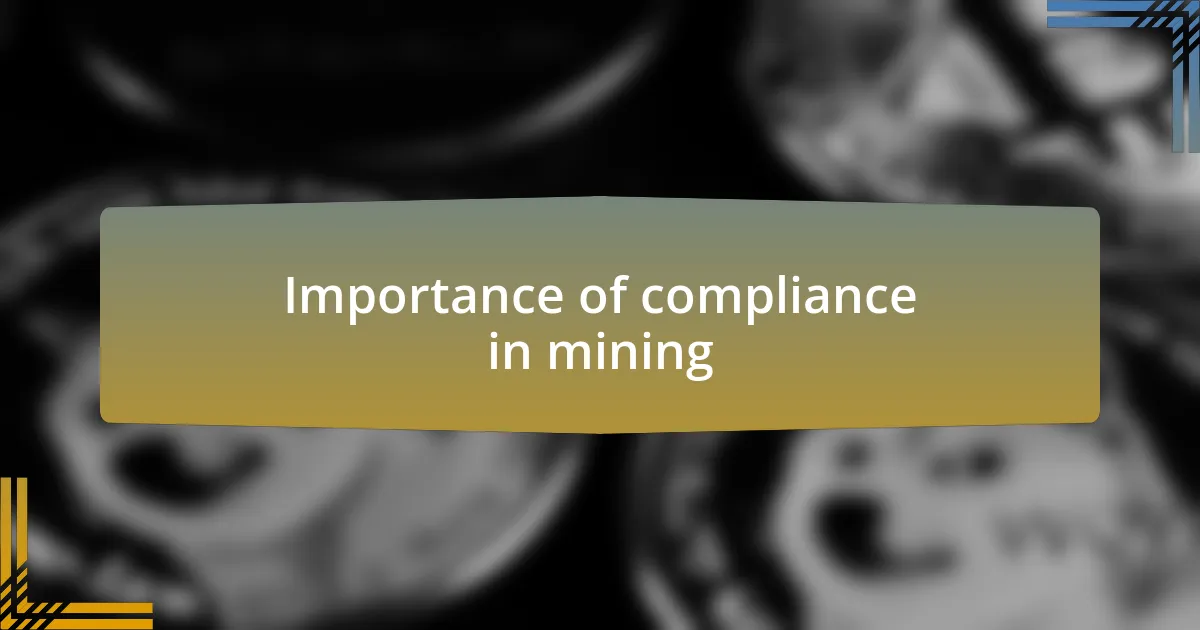
Importance of compliance in mining
Compliance in the mining sector goes beyond legal obligations; it builds trust with stakeholders and the community. I recall a project where adherence to safety regulations not only safeguarded our workers but also bolstered our reputation in the local community. Have you ever considered how compliance can enhance a company’s credibility?
Staying compliant can also prevent costly fines and project delays, ultimately affecting profitability. When I first encountered a significant compliance hurdle, it felt like a setback. However, I learned that resolving these issues promptly often resulted in smoother operations moving forward. What challenges have you faced regarding compliance, and how did they impact your investments?
Moreover, navigating compliance can reveal hidden opportunities, such as accessing government grants for environmentally responsible projects. I vividly remember a time when I discovered a funding option due to our rigorous adherence to newly implemented regulations. It was a win-win situation; we improved our operations while simultaneously enhancing our financial standing. Isn’t it fascinating how compliance can transform challenges into advantages?
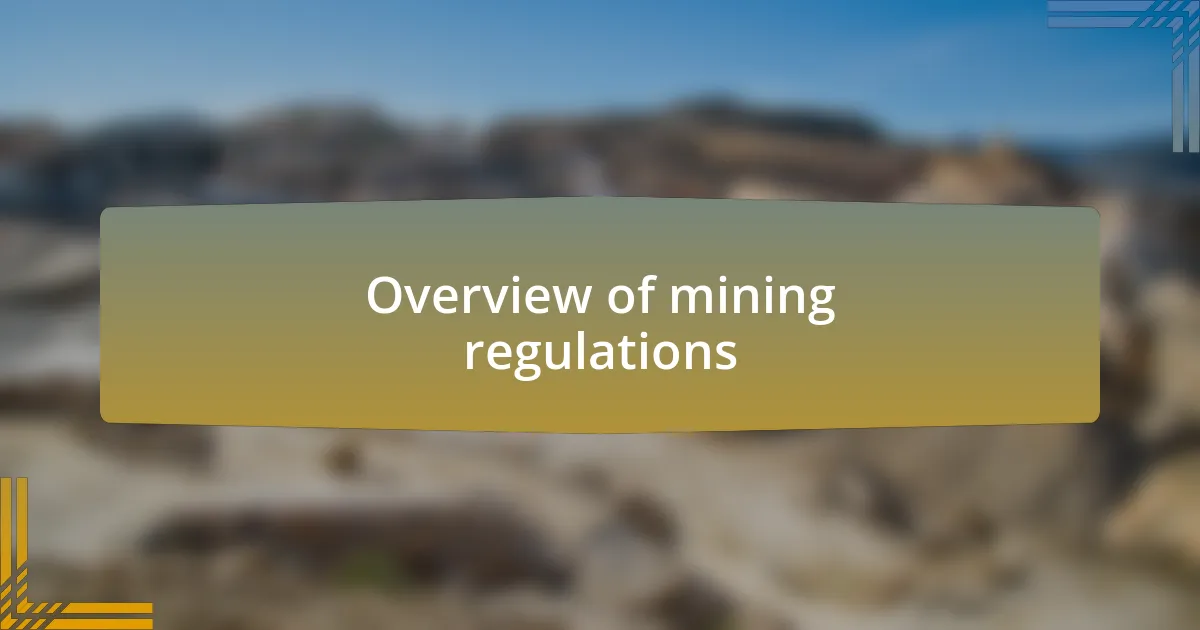
Overview of mining regulations
Mining regulations are intricate and vary widely by jurisdiction. In my experience, these regulations encompass everything from environmental protections to worker safety standards. For instance, I remember sifting through state-specific mining laws, which required meticulous attention to detail. It dawned on me just how important it was to understand not only the rules but also their implications for daily operations.
As I navigated these regulations, I was often struck by their evolving nature. Regulations can change based on political climates, societal expectations, or environmental concerns. One time, a sudden shift in local laws regarding land usage turned my planned project upside down. I had to quickly adapt, and it reminded me that flexibility is as crucial as compliance itself. Have you ever found yourself having to pivot unexpectedly due to regulatory changes?
It’s essential to recognize that regulations are designed to protect both the environment and the communities affected by mining activities. Having witnessed the positive impact of eco-friendly regulations firsthand, I can attest that they often spur innovation. I recall a collaborative effort with local environmental groups that not only ensured compliance but also enriched our project with sustainable practices. This experience reinforced my belief that engaging with regulations can lead to better outcomes for everyone involved.
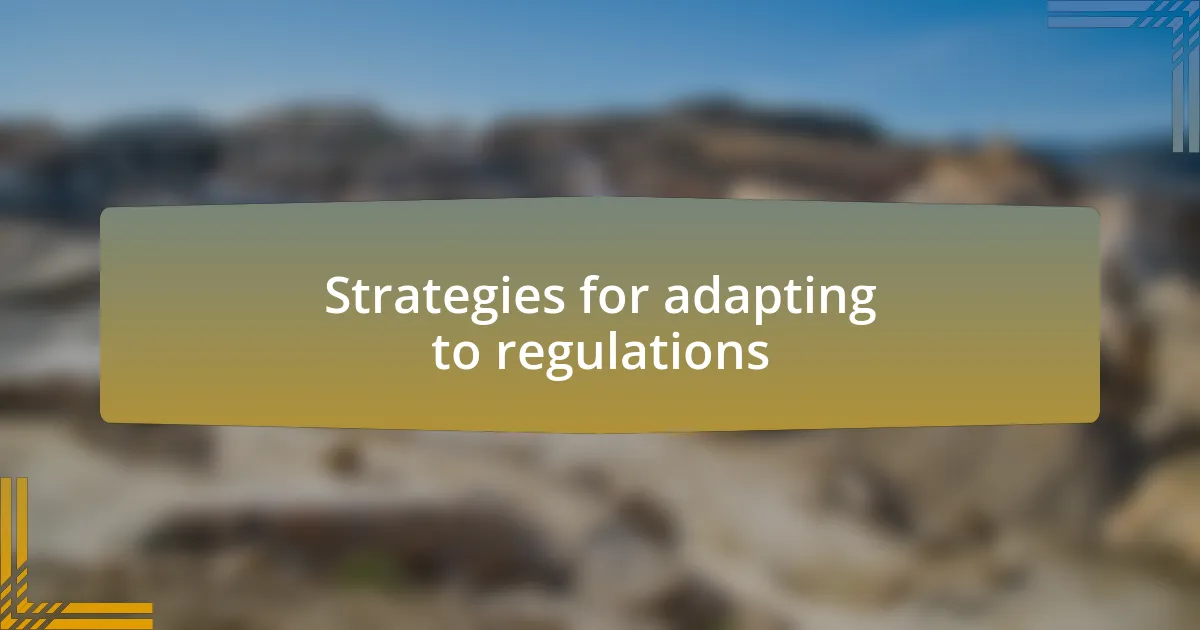
Strategies for adapting to regulations
Staying ahead of regulatory changes requires proactive education and constant vigilance. I remember attending a series of workshops focused on new compliance technologies; it was like assembling a toolkit for navigating the shifting landscape. By engaging with experts and peers, I learned that sharing insights not only eases my burden but also fosters a community-wide understanding. Have you considered collaboration as a strategy for staying updated?
Another strategy that has proven vital is the integration of adaptive management practices in my projects. I once encountered a regulatory amendment regarding water usage that caught everyone off guard. By developing a framework that allowed for flexible operational adjustments, I could swiftly respond to the new requirements without compromising our timelines. This experience taught me that building adaptability into my planning can make all the difference.
Finally, I’ve found that fostering strong relationships with regulatory bodies can be a game changer. When I reached out for clarification on ambiguous regulations, I was pleasantly surprised by the willingness to engage in dialogue. By establishing this rapport, I felt more confident in navigating compliance and gleaning insights that might be overlooked otherwise. How might relationships with regulators shape your approach to compliance?
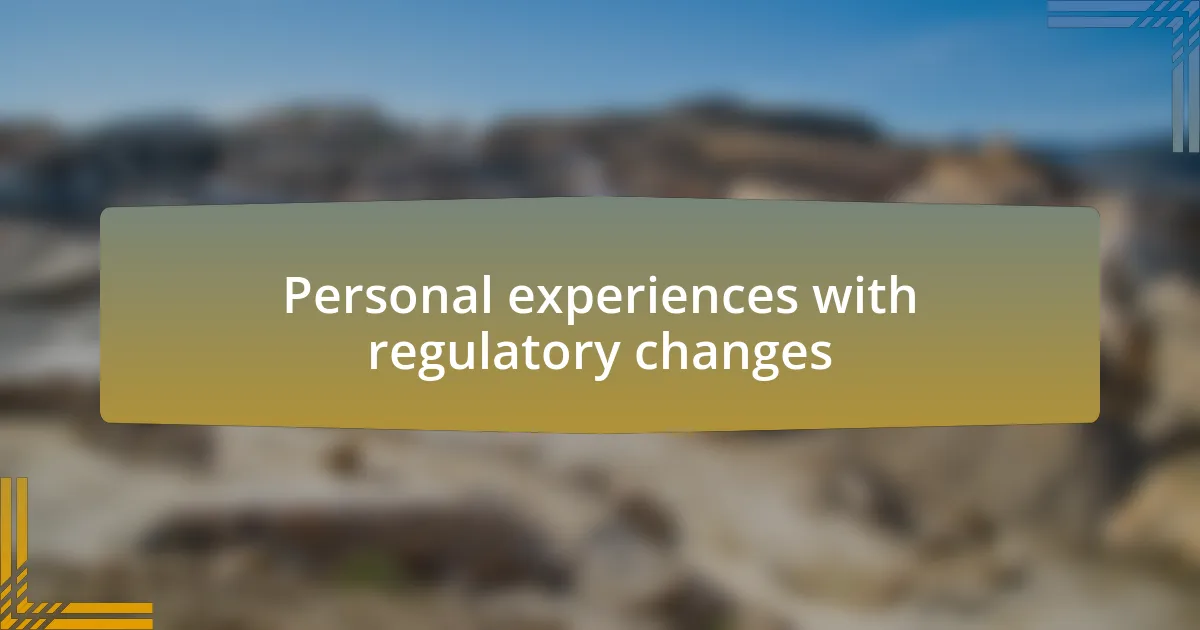
Personal experiences with regulatory changes
Navigating regulatory changes has been a rollercoaster ride for me. I remember the anxiety I felt when new taxation laws were introduced — it was like my world was turned upside down overnight. Initially, I panicked about the implications for my investments, but then I took a deep breath and turned that fear into a learning opportunity. Have you ever faced a sudden change that made you reevaluate your strategies?
One of my most memorable experiences with regulatory changes came when a new environmental policy was rolled out. Initially, I was frustrated by the potential costs associated with compliance, but as I sorted through the details, I discovered innovative ways to not only meet the requirements but also enhance my project efficiencies. The emotional shift from frustration to creativity was profound; I realized that every challenge holds a hidden opportunity. How do you typically react when faced with unexpected regulatory shifts?
In another instance, I encountered a significant delay due to shifting mining permits. At first, I felt overwhelmed, but then I decided to see it as a chance to reassess my approach. I invested time in diversifying my knowledge, learning about various compliance frameworks that could bolster my investments in the long run. This experience opened my eyes to the necessity of continuous learning; I wondered, how often do we truly prepare ourselves for the unforeseen?
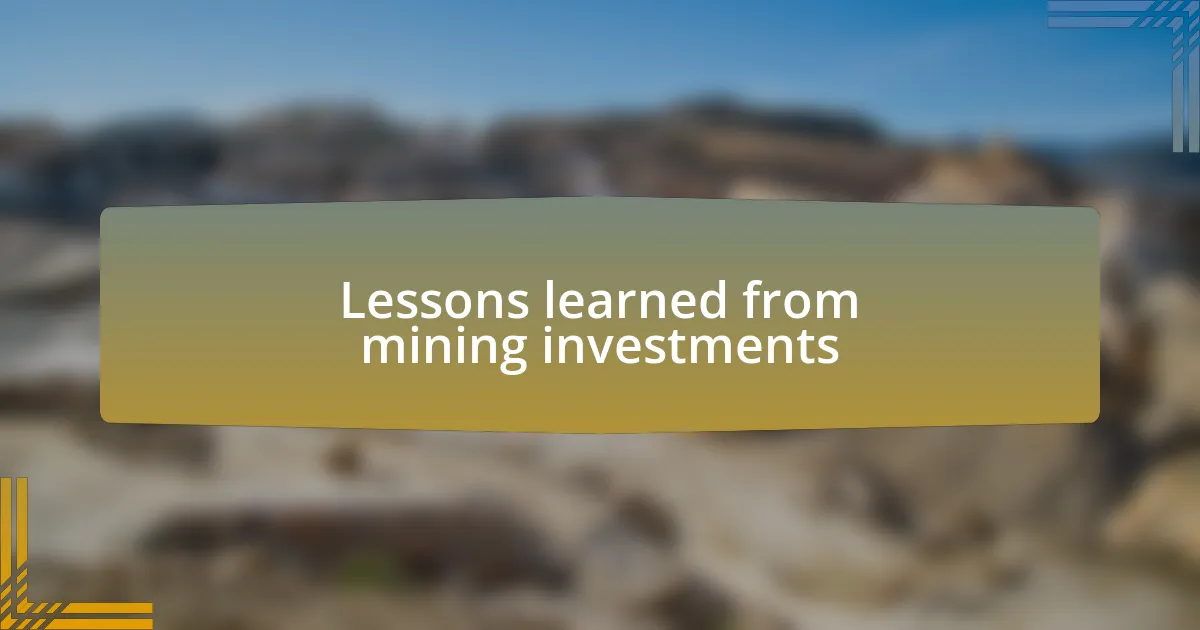
Lessons learned from mining investments
Lessons learned from mining investments
Investing in mining has taught me the importance of resilience. I recall a time when a market downturn left many investors paralyzed with fear; instead, I focused on analyzing which companies had strong fundamentals. That decision not only preserved my capital but also positioned me to take advantage of buying opportunities when others were fleeing. Have you ever shifted your perspective during a tough market?
Another lesson I’ve learned is the necessity of building strong relationships within the industry. During a challenging phase, I reached out to fellow investors and industry experts for insights. These conversations revealed not only valuable information but also fostered a sense of community that made the struggles more manageable. Isn’t it amazing how collaboration can lighten the burden?
Finally, I’ve come to realize that patience is a critical virtue in mining investments. I learned this lesson the hard way when I impulsively sold shares during a temporary decline, only to watch them rebound shortly after. Holding on through uncertainty is not easy, but it often yields the best results. Have you found that patience has paid off in your investment journey?